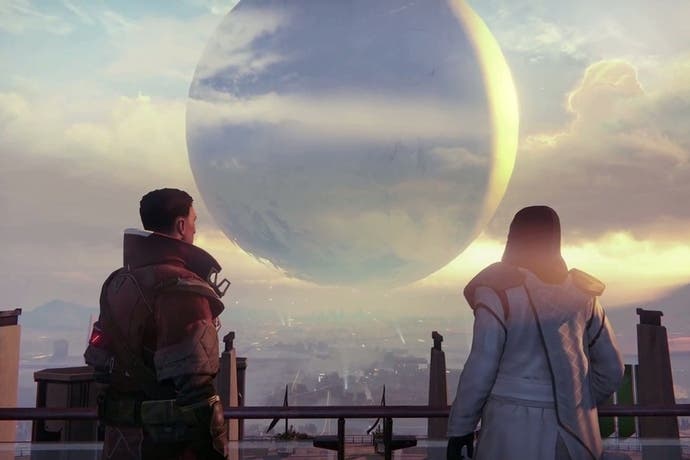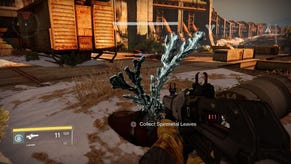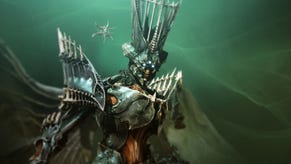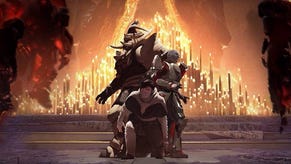Destiny: how to save online worlds
Bungie doesn't like to call its new game an MMO, but it might revolutionise them anyway.
When Bungie gave its online sci-fi shooter Destiny its gameplay debut on the Sony stage at E3 last week, there were a number of telling moments, but my favourite came early on. A dropship deposited studio founder Jason Jones' character before us (we were viewing the game through story lead Joe Staten's eyes). There was a slightly awkward pause and Jones chuckled. Then his character, a hunter clad in lightweight armour and cloak, busted out a cheerful wave and jogged over.
'Emote' animations like this wave crop up in all kinds of games, but for millions they will be redolent of one genre in particular - massively multiplayer role-playing games - and perhaps one game above all - Blizzard's World of Warcraft. Their inclusion in Destiny is theoretically trivial but ripe with meaning. They extend your personality into the game world, and your interaction with other players beyond pure gameplay. They help you make friends and influence people. They're inherently social.
Destiny's publisher Activision, Blizzard's other half, is anxious to avoid the term "MMO" for all sorts of reasons, most of them good ones. The acronym has become indelibly associated with an ageing breed of slow-paced, real-time RPG on PCs, while Destiny presents itself as a console first-person shooter in the mould of Bungie's own Halo. And MMOs' name is mud in the games industry after years of hideously expensive, failed attempts to match Blizzard's work in a genre that - designed as it was around the low speeds and high latency of 1990s dial-up internet connections - is fast approaching its sell-by date.
But if you define an MMO as an online game that presents a persistent world of adventure in which you can meet other players by chance as well as design - and personally, I do - then that's just what Destiny is. (Bungie, unveiling the game earlier this year, offered the term "shared-world".) It's the most prominent and exciting example of a new breed of online world that was everywhere you looked at E3 this year, hiding in plain sight. Ubisoft's The Division and The Crew were two more examples.
The day after the Sony premiere, I met Bungie's president Harold Ryan in a meeting room on the Activision Blizzard stand. Ryan has a sturdy, compact frame and looks fit and youthful. He starts out guarded and unwilling to talk details - Destiny is still only in the foothills of what's sure to be an epic, intensively managed and piecemeal PR campaign - but when I get on to Bungie's online philosophy for Destiny, he quickly warms to the theme.
"It's as many people who buy the game - hopefully a lot - that are the potential people you're going to encounter as you play the game" - Bungie president Harold Ryan
"I would describe it as a persistent world, yeah," he says, going on to explain Bungie's reasoning for skirting the massively multiplayer label. "Typically, MMOs don't have a rich local simulation. Destiny is first and foremost a skill-based action game. It also has a bunch of RPG elements, in that you can advance your character and collect loot and advance that loot.
"And then it has a bunch of MMO elements as well. It's as many people who buy the game - hopefully a lot - that are the potential people you're going to encounter as you play the game."
This, above all else, is what marks Destiny's online design out from the current breed of MMOs. Most online worlds restrict your potential social circle to a few hundred players running around on a walled-off copy of the game world, called a "shard". Some allow you to switch between shards to find friends, but this is seldom an intuitive experience - and the sense of artificially divided, parallel universes is jarring in a genre that otherwise thrives on total immersion.
Destiny, Ryan is saying, will have no such divisions. No creating characters on multiple servers to play with different groups of friends. No paying to transfer a character from one server to another.
Enabling this holy grail of online gaming are two important technologies. The first is Destiny's hybrid networking design, which locates itself somewhere between the server/client relationship of MMOs, where the world you're playing runs almost entirely on a distant server, and the peer-to-peer system of most online console gaming, where information is traded directly between players' machines. It's this approach that also enables Destiny to deliver the skilled, fast-paced action gameplay that MMOs have historically struggled to do.
The second technology is an intriguing concept mooted by Ryan, one which I've never heard spoken of before: "social matchmaking". This will be the glue that binds Bungie's game servers to all those locally simulated solo or co-op games running out in the wild. In the process it will turn many thousands of tiny shards into the impression of a single persistent universe - one so big it could, potentially, dwarf Eve Online's New Eden.
In order to enable any player to meet any other worldwide, Destiny needs matchmaking, just as a competitive shooter like Call of Duty or Halo needs matchmaking to set up games. But Destiny's matchmaking has a very different job to do. For one, it needs to run unobtrusively in the background; there'll be no lobbies or menus in Destiny, nothing to disturb the fantasy of a far-future guardian of mankind heading out for adventure, perhaps with friends, and meeting others along the way. It needs to be able to drop strangers into friends' games to form fireteams, and then introduce multiple fireteams to each other in the game's public areas - represented by the large-scale public event at the end of the E3 demo.
There's another, deeper difference to social matchmaking. Instead of trying to promote close competition and smooth gameplay, it's trying to promote friendship.
"So with a competitive match... decide what skill is and try to match people according to skill is the typical matchmaking," Ryan explains. "The perfect matchmaking scenario is low latency and a fun game. And in competitive games, low latency is easy to measure - not always easy to establish, but easy to measure - and a fun game is typically a challenging game where you feel like you have opportunities to win even if you lose.
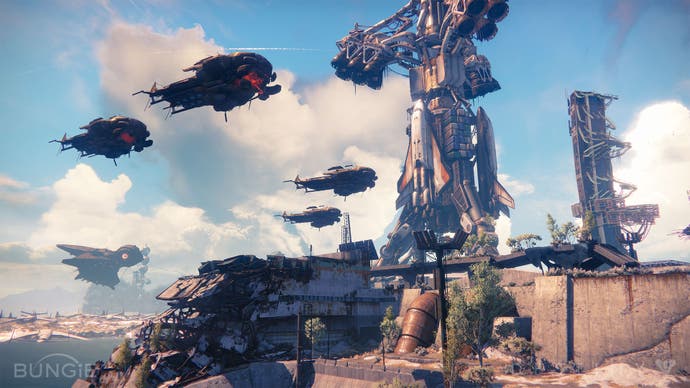
"In a co-operative game, defining a fun game is really... it's really not defined. The challenge that's there that's really exciting is to figure out how to deliver, in a social environment, a fun experience for people on a reliable basis. If you could randomly teleport a person into a social setting, say a bar or a dance club, how would you pick the dance club that was where they were going to have fun? Based on age? Not necessarily. Would it be based on gender? No, not necessarily either.
"We have ideas on how to do that... The most challenging and rewarding thing we could do in a social world for Destiny is to actually have the people you meet be a high probability of being people that you have fun playing and engaging with, and bond with and build relationships with, even if they're anonymous online gaming relationships. For that to be the norm that happens when you play Destiny would be the ideal scenario."
"For us the real goal we had for fixing [online gaming] was to come up with a social match, not just a competitive match." - Harold Ryan
It's a bold vision, albeit one that smacks of the secret-sauce algorithms that online dating sites like to wheel out in their marketing. How can you number-crunch the alchemy of friendship? But Bungie might just have the experience to deliver. "We put a lot of time and science into measuring fun," Ryan says, noting Bungie's pioneering work with Microsoft on user testing labs, undertaken during the development of Halo 3 and detailed in Wired magazine at the time.
Halo's matchmaking was the envy of its rivals, but Bungie thinks these unseen routines can do much more; indeed, advancing this dark art is a big part of what the studio wants to achieve with Destiny. When I ask Ryan what the studio wants to fix about online gaming, his answer comes instantly: "Matchmaking still is not perfect. I don't know if it will ever get perfect but there's still a lot of room to improve matchmaking in lots of ways, both in terms of how fast do you get in, how good is the quality of experience you get when you get there. And for us the real goal we had for fixing was to come up with a social match, not just a competitive match. That's still a work in progress, and I hope we do really well at it, but we'll see what happens when we get there."
After Destiny's spectacular live debut at E3, it might seem strange to dwell on a back-end technology at such length. There are a lot of sexier topics to discuss. There's the game's stunning art direction, for one, which mixes surprisingly hard sci-fi with fantasy, steampunk and organic motifs and a solid grounding in the familiar real world. To my eyes, it's one of the most distinctive and exciting visual designs for science fiction since Ralph McQuarrie brought battered asymmetry and medivalism to George Lucas's galaxy far, far away. This is a richly textured world with a visible history, arguably much more so than Halo's militaristic space opera, and it has me thinking of SF authors like Peter F Hamilton and the late Iain M Banks as well as Star Wars.
Then again, there are the Halo callbacks in the demo that let you know the creators of the definitive sci-fi shooter are in charge, from the ammo read-out on Staten's pulse rifle to the chatty orb - an intelligence called a "Ghost" - that accompanies and assists him, like the infamous 343 Guilty Spark. (The Ghost is voiced with characteristic elegance by Game of Thrones' Peter Dinklage.) Or perhaps your boat might be floated by the RPG elements that bubble up, notably the elaborate guns you loot from enemies, each of which can be customised through its own talent tree of upgrades.
For me, though, it was that little wave that caught my attention, and then two words that sealed the deal: "Public Event." When Jones and Staten emerged from their co-op adventure - so like those that I relished in the Halo series - into a public area where other fireteams seamlessly converged on a big fight with a bug-like automaton, Destiny linked an experience I already know I love with one I've been looking for from MMOs for years, but finding only fleetingly, most recently in Guild Wars 2. It's the thrill of encountering other players in the wild and then having your goals converge with theirs in a natural and unforced way.
The potential of MMOs has always resided in the way they refuse to draw lines between solo, co-operative and competitive play, between friends and strangers. And yet those cracks always seem to appear regardless.
The vision outlined by Ryan, held together by the concept of social matchmaking, is perhaps the most convincing answer to that problem I've heard to date. The goals are the same as the traditional MMO, but the gameplay, the philosophy and the technology are quite different. Perhaps that puts it in a different genre, earns it a different label; I don't much care if it does. Destiny doesn't have to call itself an MMO to save them.
